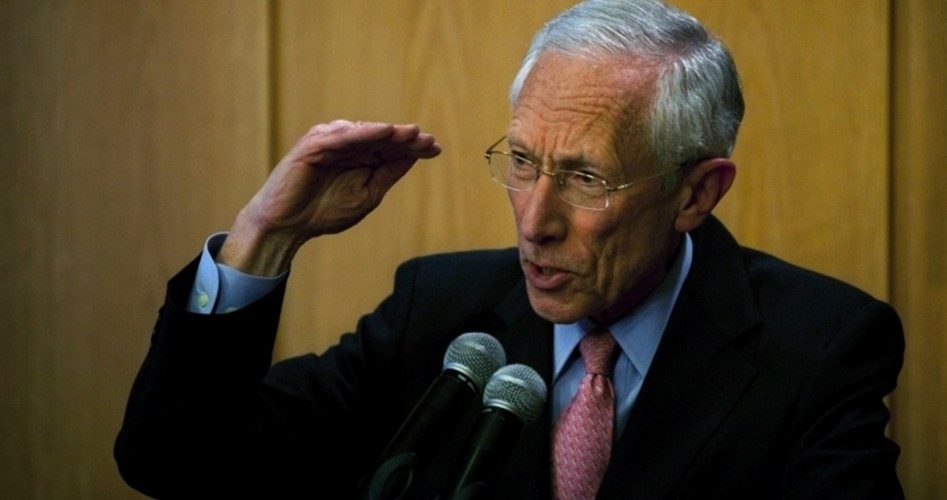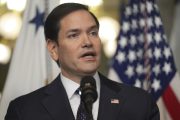
If some of Stanley Fischer’s press clippings are accurate descriptions of his powers and abilities, the banking superstar should descend on the Federal Reserve with a capital “S” on his chest and his red cape flowing behind him. The former governor of the Bank of Israel has been receiving rave reviews since his pick by President Obama for the No. 2 position at the Fed was announced last December by Israeli television, a full month before Obama announced the choice on January 10. If confirmed by the Senate, Fischer (shown) will become the vice chairman of the Federal Reserve Board, succeeding Janet Yellen, who has been nominated to succeed Chairman Ben Bernanke. Bernanke, who announced his retirement last year, spent his last day at the Fed on Friday after eight years at the helm of the nation’s central bank.
Fischer’s nomination is “A Perfect Ten Strike,” wrote a bowled-over headline writer at Forbes magazine. “It’s almost like a central bank hall of fame,” declared Robert Hall, chairman of the National Bureau of Economic Research’s committee that decides when expansions begin and end. Bloomberg News quoted him as noting that Yellen and Fischer “have a huge track record as central bankers.”
“I don’t know why he wants to do this, but we should be so lucky,” wrote Bo Cutter on the “Next New Deal” blog of the Roosevelt Institute.
Fischer, 70, has cast a long shadow both as an international banker and a professor of economics at MIT, where his all-star roster of students included Bernanke, who counts Fischer among his most influential mentors; Mario Draghi, president of the European Central Bank; N. Gregory Mankiw, chairman of the Council of Economic Advisers under President George W. Bush; and Olivier Blanchard, chief economist at the International Monetary Fund.
“Stanley Fischer would be the perfect choice, given his unique combination of skills, qualities, and experience,” Harvard economics professor Jeffrey Frankel wrote in praise of his fellow member of the Council on Foreign Relations, the influential organization best known for its tireless advocacy of a world-government agenda. Fischer’s CFR credentials and his impressive resumé as a powerful figure in the world of international banking suggest he will fit well on a Federal Reserve Board, headed by CFR member Yellen. Obama has announced his choice of two other prominent CFR members, Leal Brainard and Jerome Powell, to serve on the Fed’s seven-member governing board.
Fischer was chief economist at the World Bank and deputy managing director of the International Monetary Fund, two institutions created at the Bretton Woods Conference in 1944 to promote international control over national fiscal and monetary policies. During his reign as Israel’s banking chief (2005-2013), Fischer, who has both U.S. and Israeli citizenship, was credited with having steered the Israeli economy through the global economic crisis of 2008-2009 without the severe recession suffered by many of the other industrialized nations. His tenure as vice chairman at Citigroup (2002-2005) on the other hand, has given rise to some skepticism about his ability to recognize an economic crisis in the making. In a column entitled “Which Stanley Fischer?,” Bloomberg’s Matthew C. Klein wrote:
Risk-taking at Citigroup increased significantly in 2004 and 2005 when [former Treasury Secretary Robert] Rubin was chairman of the executive committee of the bank’s board, with disastrous consequences in the years that followed. Bonuses that were paid in those early years weren’t subsequently clawed back, either as losses materialized or when the government had to step in with huge bailouts.
Fischer reported directly to Rubin, but there is no record that he sounded any kind of alarm, public or private. In that regard, he is no different from any other Citigroup executive of the period.
Klein also referred to Fischer’s role at the IMF in “the botched liberalization of the Russian economy” in the early 1990s, when market mechanisms were introduced before the needed legal and political reforms had been established.
“Unfortunately for Russia, this set of priorities helped make it possible for oligarchs to strip the state of assets as the economy collapsed,” Klein wrote.
When Fischer announced he was a candidate for the top job at the International Monetary Fund in 2011, Mark Weisbrot, co-director of the Washington-based Center for Economic and Policy Research, claimed his appointment would “institutionalize lack of accountability” at the IMF. Fischer, who was 67 at the time, was barred by the IMF age limit of 65 from being its managing director.
“Some of the IMF’s worst economic mistakes in its history occurred while Fischer was there,” Weisbrot said in a statement that claimed the IMF intervention in Russia during Fischer’s tenure “led to one of the worst losses in output in history, in the absence of a war or natural disaster.” It went on to say that in both Russia and Argentina, rapid economic growth occurred “after they had rid their countries of the IMF and its policy prescriptions.”
James Carden, a former adviser to the U.S.-Russia Bilateral Presidential Commission, cites Fischer’s “long track record of implementing neoliberal economic ‘reforms’ without paying due attention to their consequences for people of ordinary means.” President Obama “would do well to reconsider the wisdom of this particular appointment,” Carden wrote in The American Conservative.
Members of the Senate Banking, Housing and Urban Affairs Committee will have the opportunity to question Fischer about his role at Citibank, IMF, and other stops along his long and celebrated career. Given the inter-connected world of the global banking community, it seems likely, however, that the Stanley Fischer fan club will outnumber the doubters and dissenters. At the annual gathering of the world’s central bankers at the Grand Teton National Park a few years ago, Fed Chairman Bernanke noted one thing they had in common: “They all had Stan Fischer as their thesis adviser.”
Photo of Stanley Fischer: AP Images


